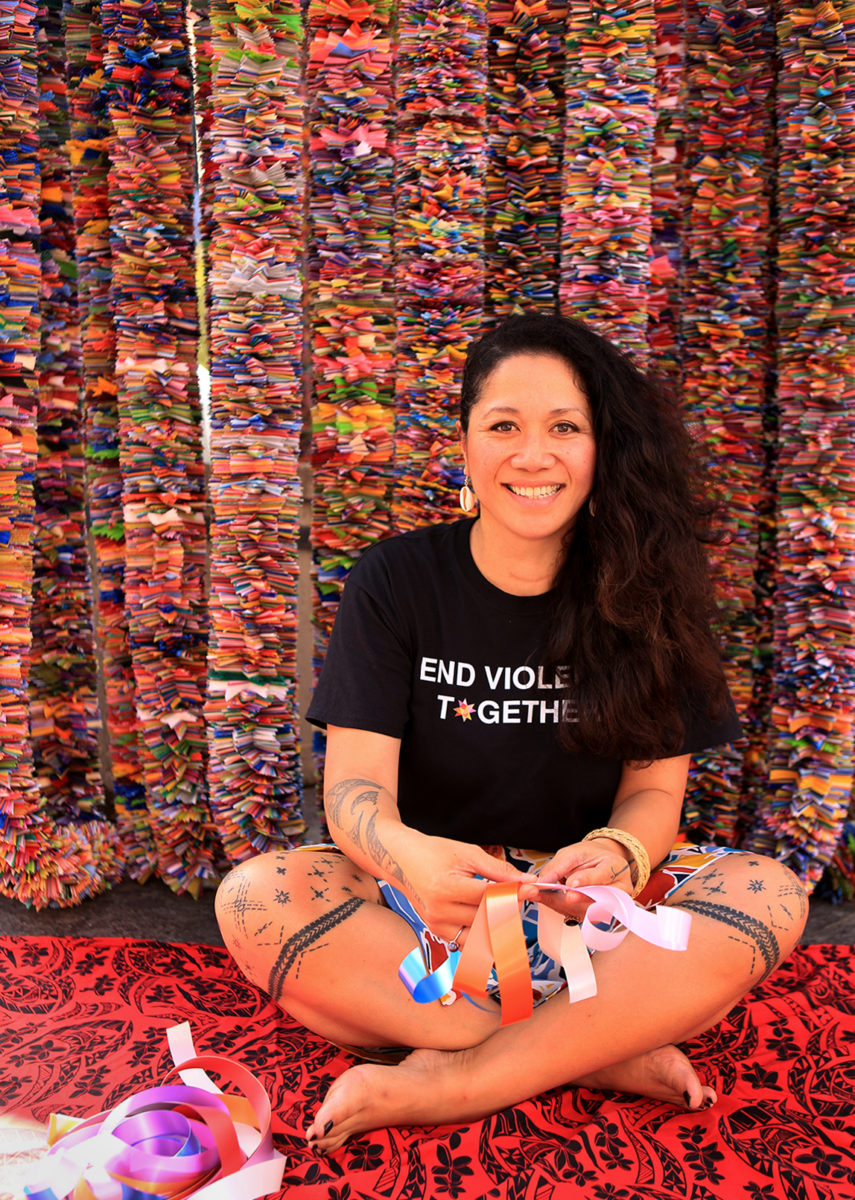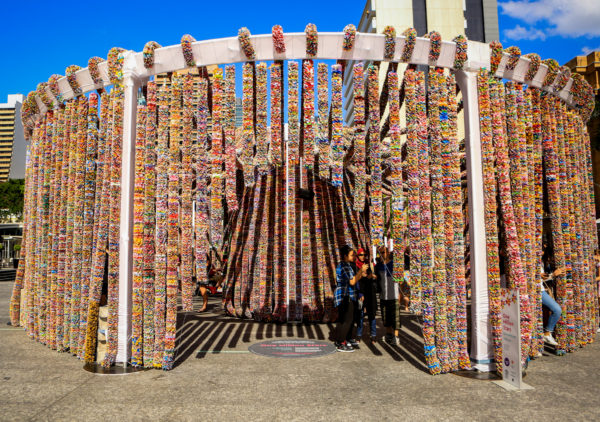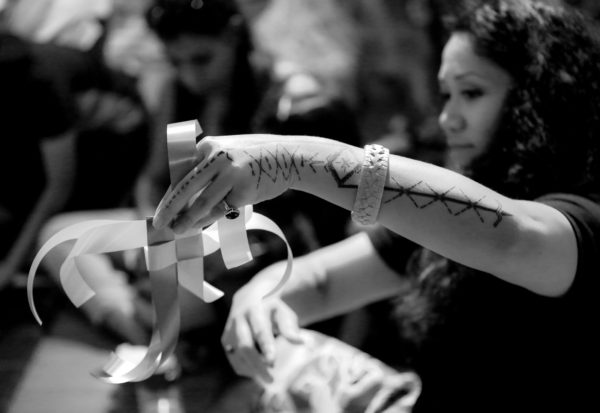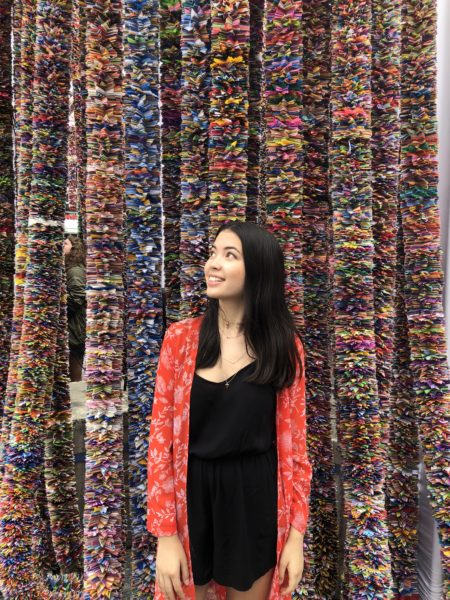
Meet the woman who inspired people across the globe to weave 2.4 million stars for peace
If you visited King George Square in Brisbane in early April 2018, you would’ve seen the spectacular installation of one million paper stars. Each star was carefully hand-woven by participants from all across the globe in an effort to end violence. The woman behind it all was Samoan-Australian artist and weaver Maryann Talia Pau.

“Weaving is a therapeutic and healing practice for me,” she explained. “I’ve heard many stories from those weaving stars that they have found it to be therapeutic and wonderful way to de-stress and relax from a hard day or experience. Weaving helps to slow the mind and helps to focus purely on the task ahead. I’ve had my own battles with depression and anxiety and making and weaving has helped me find the tools and energy to manage it better.”
Weaving culture
Weaving is also something that is practiced widely across Pacific Island culture so it is profoundly linked to her cultural heritage. Maryann describes herself as a maker and a storyteller, using weaving as a means of self-reflection as well as spreading a positive message with others.
“Through my arts practice, I get to practise some age-old crafts that I imagine aunties and grandmothers gathering around to do whilst building new relationships and friendships with people in the community.”
Maryann’s work stretches across a wide range of ventures from running weaving workshops, designing and operating the Super Native brand, selling her handcrafted jewellery, presenting her work in museums and galleries and engaging in projects like ‘One Million Stars to End Violence’.

One Million Stars
In 2012, the tragic rape and murder of of Jill Meagher deeply impacted Maryann and her neighbourhood, bringing grief and heartbreak to the entire community. Maryann credits the words of Martin Luther King for giving her strength and fortitude during that time.
“Returning hate for hate multiplies hate, adding deeper darkness to a night already devoid of stars. Darkness cannot drive out darkness; only light can do that. Hate cannot drive out hate; only love can do that.”
Inspired by the idea of being the light in darkness, Maryann was compelled to go home to her studio and weave stars.
“The star is special for me as an artist and Pasifika woman because it reminds me of the voyages of my ancestors across the Pacific Islands. They had to navigate the stars and be brave, bold and creative to explore the oceans and find their way home. When things are difficult, I look up and remember my navigating stars and it helps me to focus and find my way.”
She began the ‘One Million Stars to End Violence’ project and she made a call out asking for people to join her. The goal was to weave one million eight-pointed paper stars by 2018 as a symbol of peace and strength.
The project received an incredible response with young people, seniors, arts, volunteer and multicultural groups, Aboriginal and Torres Strait Islanders groups and services, schools, councils and libraries all resonating with the message and contributing to the project. Maryann received stars from several different countries across the globe including Nigeria, USA, Canada, Kenya, Barbados, Fiji, Tonga, Japan, New Zealand, Malaysia, Samoa, Scotland, England, Cook Islands and Australia. By 2018, Maryann received 2.4 million stars.

The installation was presented by the Museum of Brisbane as part of Festival 2018 for the Gold Coast Commonwealth Games. One million stars were hung in the middle of King George Square as the main installation whilst the rest of the stars were scattered in various displays across Queensland and Commonwealth Games and Festival locations. From the casual passer-by to passionate weavers who travelled long distances, the installations were visited and admired by many. Maryann even welcomed Camilla, the Duchess of Cornwall, to the Brisbane installation. Whilst Maryann is humbled by the attention her project received, she ascribes it to the universal aspiration of peace and the coming together of communities in the face of adversity.
“Overall I hope the sight of one million stars shows just how much we can achieve when we work together to create change and that it inspires hope, pride and belonging in our communities.”
The importance of diversity
As a culturally diverse artist, Maryann is also committed to creating change and fostering a sense of belonging for all kinds of people within the arts.
“There can only be richness and positive outcomes from engaging and learning from artists from varying backgrounds. I’m looking forward to when it’s normal for artists of varying orientations, genders and cultures to present work that speaks to new experiences and values. I think it’s important for us to support each other as well, particularly our Aboriginal and Torres Strait Islander brothers and sisters in the arts, and approach our practice with generosity and pride. I think there’s still a lot of work to be done to do support these people and communities.”
Advice for emerging artists
What advice would she give to emerging artists, particularly those whose work or identity might not always be recognised in the mainstream?
“Focus on creating quality work that is curated and told using your voice. Find organisations and galleries that support this. People will want to reword your work to make it accessible or palatable to their audiences, but know when you are being supported and when others are trying to take ownership of your work and refashion it away from your original vision. Talk to people who are in the industry and doing what you aspire to do. Lots of people will have advice on which strategy is best, what skills to develop or study or where to show work. Talk to people who are doing it, not thinking about it. Be open, brave and kind always. That’s been my greatest advice and has helped me immensely.”
